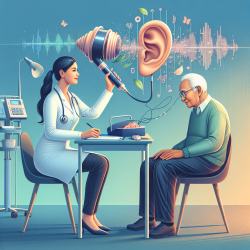The prevalence of hearing impairment among people living with dementia (PwD) is notably high, with studies indicating that up to 87% of PwD experience some degree of hearing loss. This overlap poses unique challenges for audiologists who must navigate the complexities of assessing and rehabilitating hearing in this population. The recent research article "Hearing Assessment and Rehabilitation for People Living With Dementia" provides valuable insights and recommendations for practitioners looking to enhance their skills in this area.
The Importance of a Person-Centered Approach
A key takeaway from the research is the emphasis on person-centered care, particularly through the VIPS model. This model highlights four critical components: Valuing people with dementia, recognizing their individuality, understanding their perspective, and creating a supportive social environment. By integrating these principles into practice, audiologists can tailor their assessments and interventions to meet the unique needs of each patient.
Adapting Clinical Practices
- Environment: Create dementia-friendly clinical settings that are less clinical and more homely. Simple changes like clear signage and familiar objects can significantly reduce anxiety for PwD.
- Communication: Use clear, simple language and non-verbal cues to facilitate understanding. Involve family members or caregivers in appointments to provide additional support.
- Assessment Techniques: Modify standard audiometric procedures by using pulsed tones, reducing test duration, and allowing caregivers to be present during assessments.
Overcoming Challenges in Hearing Assessment
One of the primary challenges in assessing hearing in PwD is distinguishing between cognitive and auditory difficulties. The research suggests that with appropriate adaptations, reliable hearing assessments can be conducted even in those with mild dementia. For those unable to complete standard tests, alternative methods such as functional assessments or objective tests like otoacoustic emissions may be employed.
The Role of Technology
Advancements in hearing technology offer new opportunities for intervention. Personal amplification devices can be a viable alternative to traditional hearing aids for some PwD, providing ease of use and cost-effectiveness. Additionally, the research highlights the potential benefits of early intervention in improving outcomes for PwD.
Encouraging Further Research
The article underscores the need for further research into effective adaptations for hearing assessments and interventions tailored to cognitive status. Practitioners are encouraged to contribute to this growing body of knowledge by exploring innovative approaches and sharing their findings with the broader audiology community.
Conclusion
By implementing the recommendations from this research, practitioners can significantly enhance their ability to assess and rehabilitate hearing loss in people living with dementia. Embracing a person-centered approach not only improves patient outcomes but also enriches the practice of audiology as a whole.
To read the original research paper, please follow this link: Hearing Assessment and Rehabilitation for People Living With Dementia.










